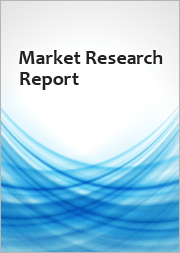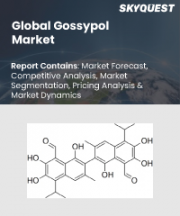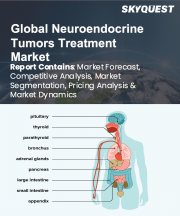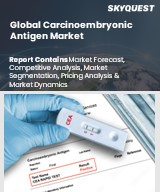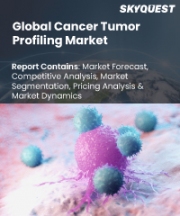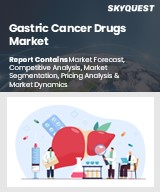
|
시장보고서
상품코드
1623304
종양괴사인자(TNF) 저해제 시장 규모 : 약제 유형별, 용도별, 유통 채널별, 지역별, 범위 및 예측Global Tumor Necrosis Factor TNF Inhibitor Drugs Market Size By Drug Type, By Application (Rheumatoid Arthritis, Psoriasis and Psoriatic Arthritis, Crohns Disease), By Distribution Channel, By Geographic Scope and Forecast |
||||||
종양괴사인자(TNF) 저해제 시장 규모와 예측
종양괴사인자(TNF) 저해제 시장 규모는 2024년에 2,488억 달러로 평가되며, 2024-2031년에 64.00%의 CAGR로 성장하며, 2031년에는 13조 196억 5,000만 달러에 달할 것으로 예측됩니다. TNF-a는 류마티스 관절염, 건선, 크론병, 강직성 척추염과 같은 자가면역질환 및 염증성 질환의 주요 원인으로 전신 염증 및 면역반응에 관여하는 TNF-a를 억제하는 약물입니다. 이 약물은 TNF-a를 차단하고 염증을 억제하고 증상을 완화하고 질병의 진행을 늦춥니다.
종양괴사인자(TNF)를 억제하는 약물은 다양한 염증성 질환 및 자가면역질환의 치료에 큰 변화를 가져왔습니다. 이 약물들은 다양한 만성질환의 발병에 관여하는 염증성 사이토카인인 TNFα를 표적으로 삼고 이를 중화시킴으로써 작용하며, TNF 억제제는 주로 류마티스 관절염의 치료에 사용됩니다. 류마티스 관절염은 만성 자가면역질환으로 염증과 관절의 퇴행을 유발하는 질환입니다.
종양괴사인자(TNF) 억제제의 향후 사용은 현재 진행 중인 연구로 인해 현재보다 더 광범위한 질환에 대한 치료 가능성이 밝혀짐에 따라 크게 증가할 것으로 예상되며, TNF 억제제는 전통적으로 류마티스 관절염, 크론병, 건선 등 자가면역질환 치료에 사용되어 왔습니다. 이들 질환에 관여하는 염증성 사이토카인인 TNFα를 표적으로 중화시키는 역할을 합니다.
종양괴사인자(TNF) 억제제 세계 시장 역학
주요 시장 성장 촉진요인
자가면역질환 증가
류마티스 관절염, 크론병, 건선 등 자가면역질환의 유병률 증가가 TNF 억제제 수요를 견인하고 있습니다. 세계보건기구(WHO)에 따르면 자가면역질환은 전 세계에서 증가하고 있으며, 류마티스 관절염만 해도 전체 인구의 1%를 차지하는 것으로 추정됩니다.
바이오기술의 발전
최근 생명공학의 발전으로 TNF 억제제의 개발 및 효능이 크게 향상되었습니다. 제형 개선과 바이오시밀러의 도입으로 치료 옵션이 증가하고 TNF 억제제를 더 저렴하게 이용할 수 있게 되었습니다. 예를 들어 바이오시밀러의 개발로 인해 치료비용이 절감되는 한편, 시장 경쟁이 치열해지면서 TNF 억제제 시장이 성장하고 있습니다.
인식 및 진단 향상:
자가면역질환에 대한 이해와 조기 발견에 대한 인식이 높아지면서 TNF 억제제에 대한 수요가 증가하고 있습니다. 인식 개선 캠페인과 진단 툴의 발전으로 TNF 억제제가 효과가 있는 질환으로 진단받는 환자가 증가하고 있습니다. 미국 류마티스학회에 따르면 조기에 정확한 진단을 통해 만성질환을 더 잘 관리할 수 있으며, TNF 억제제와 같은 효과적인 약물의 중요성을 강조하고 있습니다.
주요 과제
감염 위험:
TNF 억제제는 면역 체계를 약화시켜 감염에 취약하게 만듭니다. 이러한 약물을 사용하는 환자는 결핵, 진균 감염증, 기회주의 병원체 등 심각한 감염에 걸리기 쉽습니다. 치료 시작 전 모니터링 및 잠복결핵 검사와 같은 예방 조치는 중요하지만 환자 관리 및 치료 순응도를 복잡하게 만듭니다.
높은 비용:
TNF 억제제는 가장 비싼 약물 중 하나입니다. 이러한 고가의 약품은 환자, 특히 보험이 완전히 적용되지 않는 환자들의 접근성을 제한할 수 있습니다. 또한 이러한 경제적 부담은 의료 시스템에 부담을 주고, 지역 간 또는 집단 간 치료 접근성 격차를 초래할 수 있습니다.
장기적인 안전에 대한 우려
TNF 억제제의 장기적인 안전성은 여전히 우려의 대상이며, TNF 억제제의 장기 사용은 암 및 자가면역질환의 위험 증가와 관련이 있습니다. 이러한 위험을 더 잘 이해하고 잠재적인 부작용을 줄일 수 있는 기술을 찾기 위해서는 장기적인 연구가 필요합니다.
주요 동향
바이오시밀러의 채택
눈여겨봐야 할 동향 중 하나는 TNF 억제제 바이오시밀러의 사용이 증가하고 있다는 점입니다. 바이오시밀러는 오리지널 의약품의 생물제제와 실질적으로 동일한 복제품으로, 보다 저렴한 대안을 제공합니다. 인플릭시맙, 에타너셉트 등 주요 TNF 억제제의 특허가 만료됨에 따라 바이오시밀러는 비용 절감과 유사한 효능 및 안전성 프로파일로 인해 인기를 끌고 있습니다.
새로운 적응증으로의 확장
TNF 억제제는 지금까지 알려지지 않은 새로운 용도로 사용되고 있습니다. 이러한 증가는 TNF 억제제의 치료용도 확대를 위한 지속적인 연구와 임상연구를 반영하는 것으로, 새로운 시장 기회와 다양한 염증성 질환을 앓고 있는 환자들을 위한 더 나은 치료 옵션으로 이어질 수 있습니다.
신규 TNF 억제제 개발:
업계는 더 나은 특성을 가진 새로운 TNF 억제제를 도입하고 있습니다. 제약 개발자들은 효능이 향상되고 부작용이 적으며 환자의 순응도가 개선된 차세대 TNF 억제제를 개발하기 위해 노력하고 있습니다. 보다 구체적인 작용기전을 가지고 있고, 투여 요법을 강화한 약물이 혁신적 사례입니다.
목차
제1장 서론
- 시장의 정의
- 시장 세분화
- 조사 방법
제2장 개요
- 주요 조사 결과
- 시장 개요
- 시장 하이라이트
제3장 시장 개요
- 시장 규모와 성장의 가능성
- 시장 동향
- 시장 성장 촉진요인
- 시장 성장 억제요인
- 시장 기회
- Porter's Five Forces 분석
제4장 종양괴사인자(TNF) 저해제 시장 : 약제 유형별
- 모노클로널 항체(mAbs)
- 가용성 TNF 수용체
- 바이오시밀러
제5장 종양괴사인자(TNF) 저해제 시장 : 용도별
- 류마티스 관절염(RA)
- 건선 및 건선성 관절염(PsA)
- 크론병
- 강직성 척추염
- TNF 저해제가 사용되는 기타 자가면역질환
제6장 종양괴사인자(TNF) 저해제 시장 : 유통 채널별
- 병원 약국
- 소매 약국·드러그스토어
- 온라인 약국
제7장 지역별 분석
- 북미
- 미국
- 캐나다
- 멕시코
- 유럽
- 영국
- 독일
- 프랑스
- 이탈리아
- 아시아태평양
- 중국
- 일본
- 인도
- 호주
- 라틴아메리카
- 브라질
- 아르헨티나
- 칠레
- 중동 및 아프리카
- 남아프리카공화국
- 사우디아라비아
- 아랍에미리트
제8장 시장 역학
- 시장 성장 촉진요인
- 시장 성장 억제요인
- 시장 기회
- 시장에 대한 COVID-19의 영향
제9장 경쟁 구도
- 주요 기업
- 시장 점유율 분석
제10장 기업 개요
- AbbVie
- Amgen
- Johnson & Johnson
- Novartis
- Pfizer
- Merck & Co.
- Samsung Bioepis
- Sanofi
- Boehringer Ingelheim
제11장 시장 전망과 기회
- 신규 기술
- 향후 시장 동향
- 투자 기회
제12장 부록
- 약어 리스트
- 전시와 참고 문헌
Tumor Necrosis Factor TNF Inhibitor Drugs Market Size and Forecast
Tumor Necrosis Factor TNF Inhibitor Drugs Market size was valued at USD 248.8 Billion in 2024 and is projected to reach USD 13019.65 Billion by 2031, growing at a CAGR of 64.00% from 2024 to 2031. TNF inhibitors are medications that suppress the pro-inflammatory cytokine TNF-a which plays a role in systemic inflammation and immunological response. TNF-a is a key factor in the development of autoimmune and inflammatory disorders like rheumatoid arthritis, psoriasis, Crohn's disease, and ankylosing spondylitis. These medications block TNF-a, reducing inflammation, alleviating symptoms, and slowing the evolution of diseases.
Drugs that block tumor necrosis factor (TNF) have transformed the treatment of a variety of inflammatory and autoimmune disorders. These medications function by targeting and neutralizing TNF-alpha, a pro-inflammatory cytokine involved in the development of various chronic diseases. TNF inhibitors are primarily used to treat rheumatoid arthritis. RA is a chronic autoimmune illness that causes inflammation and joint degeneration.
The future use of Tumor Necrosis Factor (TNF) inhibitor medications is expected to grow dramatically as ongoing research reveals their potential in treating a larger spectrum of illnesses than their current uses. TNF inhibitors have traditionally been used to treat autoimmune disorders such as rheumatoid arthritis, Crohn's disease, and psoriasis by targeting and neutralizing TNF-alpha, a pro-inflammatory cytokine implicated in these conditions.
Global Tumor Necrosis Factor TNF Inhibitor Drugs Market Dynamics
The key market dynamics that are shaping the global tumor necrosis factor TNF inhibitor drugs market include:
Key Market Drivers:
Rising Incidence of Autoimmune Diseases
: The rising prevalence of autoimmune disorders such as rheumatoid arthritis, Crohn's disease, and psoriasis is driving demand for TNF inhibitor medications. According to the World Health Organization (WHO), autoimmune disorders are on the rise worldwide with rheumatoid arthritis alone accounting for an estimated 1% of the population.
Advancements in Biotechnology:
Recent advances in biotechnology have considerably improved the development and efficacy of TNF inhibitors. Improved medication formulations and the introduction of biosimilars are increasing therapy options and making TNF inhibitors more affordable. For example, the development of biosimilars has reduced treatment costs while increasing market competition resulting in growth in the TNF inhibitor market.
Increased Awareness and Diagnosis:
Better understanding and early detection of autoimmune disorders contribute to the increased need for TNF inhibitors. As awareness campaigns and diagnostic tools advance, more people are being diagnosed with illnesses that can benefit from TNF inhibition. According to the American College of Rheumatology, early and precise diagnosis leads to better management of chronic diseases emphasizing the importance of effective medications such as TNF inhibitors.
Key Challenges:
Infection Risk:
TNF inhibitors can depress the immune system making it more susceptible to infection. Patients using these drugs are more susceptible to serious infections such as tuberculosis, fungal infections, and opportunistic pathogens. Monitoring and preventive measures such as screening for latent tuberculosis before beginning treatment are critical but they also complicate patient care and therapy adherence.
High Cost:
TNF inhibitors are some of the most expensive drugs available. The high cost of these drugs may limit access for patients, particularly those without complete insurance coverage. This financial burden can also put a strain on healthcare systems leading to discrepancies in treatment availability between areas and populations.
Long-Term Safety Concerns
: TNF inhibitors' long-term safety remains a source of concern. Prolonged use of these medicines has been linked to an increased risk of cancer and autoimmune diseases. Long-term research is still required to further understand these dangers and identify techniques for reducing potential negative consequences.
Key Trends:
Biosimilar Adoption
: One notable trend is the increasing use of TNF inhibitor biosimilars. Biosimilars are virtually identical clones of branded biological medications that provide a more affordable option. With the patents for key TNF inhibitors such as infliximab and etanercept expiring, biosimilars have gained popularity due to their reduced cost and similar efficacy and safety profile.
Expansion into New Indications
: TNF inhibitors are being used in new ways that are not previously known. This increase reflects continuing research and clinical studies targeted at expanding the therapeutic applications of TNF inhibitors which could lead to new market opportunities and better treatment options for patients suffering from a variety of inflammatory disorders.
Development of Novel TNF Inhibitors:
The industry is seeing the introduction of novel TNF inhibitors with enhanced characteristics. Drug developers are working on next-generation TNF inhibitors with increased efficacy, fewer side effects, and greater patient compliance. Drugs with more specific modes of action and enhanced dosing regimens are examples of innovations.
What's inside a VMR industry report?
Our reports include actionable data and forward-looking analysis that help you craft pitches, create business plans, build presentations and write proposals.
Global Tumor Necrosis Factor TNF Inhibitor Drugs Market Regional Analysis
Here is a more detailed regional analysis of the global tumor necrosis factor TNF inhibitor drugs market:
North America:
In North America, the tumor necrosis factor (TNF) inhibitor medicines market is primarily driven by the rising prevalence of autoimmune illnesses and increased investment in healthcare infrastructure. Autoimmune disorders like rheumatoid arthritis, Crohn's disease, and psoriasis are growing more widespread creating a greater need for effective therapies. According to the Centers for Disease Control and Prevention (CDC), roughly 54.4 million persons in the United States have arthritis including rheumatoid arthritis which considerably increases the need for TNF inhibitors.
Significant investment in healthcare infrastructure and research in North America fuels the growth of the TNF inhibitor market. The National Institutes of Health (NIH) announced a significant increase in funding for research on autoimmune illnesses and innovative therapeutic medicines including TNF inhibitors. In 2023, the NIH will devote nearly USD 1.4 Billion to autoimmune disease and inflammatory research underscoring the region's commitment to developing therapeutic choices and improving patient outcomes. This strong financial backing enables the discovery and availability of novel TNF inhibitors, hence promoting market growth.
Asia Pacific:
The tumor necrosis factor (TNF) inhibitor pharmaceuticals market is expanding rapidly in Asia Pacific owing to several causes. The rising prevalence of autoimmune illnesses in the region is the market's fastest-growing driver. According to the World Health Organization (WHO), autoimmune disorders such as rheumatoid arthritis and Crohn's disease are on the rise worldwide with a significant increase in Asia. This increased incidence immediately increases the demand for TNF inhibitors which are important in controlling these disorders since they target the inflammatory mechanisms that cause autoimmune diseases.
Another key driver for the TNF inhibitor market in the Asia Pacific is the expansion of healthcare infrastructure and improved access to innovative treatments. The region has experienced significant investment in healthcare infrastructure, particularly in growing nations such as India and China. This growth of healthcare infrastructure improves the availability and accessibility of TNF inhibitors allowing more patients to benefit from these sophisticated medicines. Furthermore, government initiatives and regulations aiming at improving healthcare access and affordability are driving the industry.
Global Tumor Necrosis Factor TNF Inhibitor Drugs Market: Segmentation Analysis
The Global Tumor Necrosis Factor TNF Inhibitor Drugs Market is segmented based on Drug Type, Application, Distribution Channel and Geography.
Tumor Necrosis Factor TNF Inhibitor Drugs Market, By Drug Type
- Monoclonal Antibodies
- Soluble TNF Receptor
- Biosimilars
Based on the Drug Type, the Global Tumor Necrosis Factor TNF Inhibitor Drugs Market is bifurcated into Monoclonal Antibodies, Soluble TNF Receptor, and Biosimilars. Monoclonal antibodies are the dominant drug type in the global tumor necrosis factor (TNF) inhibitor drugs market. This dominance is due to their proven efficacy and established clinical track record in treating autoimmune diseases such as rheumatoid arthritis and Crohn's disease. Monoclonal antibodies like infliximab and adalimumab, specifically target TNF-alpha, a key driver of inflammation in these conditions offering significant therapeutic benefits and high patient response rates.
Tumor Necrosis Factor TNF Inhibitor Drugs Market, By Application
- Rheumatoid Arthritis (RA)
- Psoriasis and Psoriatic Arthritis (PsA)
- Crohn's Disease
- Ankylosing Spondylitis
- Other
Based on the Application, the Global Tumor Necrosis Factor TNF Inhibitor Drugs Market is bifurcated into Rheumatoid Arthritis (RA), Psoriasis and Psoriatic Arthritis (PsA), Crohn's Disease, Ankylosing Spondylitis, Others. In the global tumor necrosis factor (TNF) inhibitor drugs market, Rheumatoid Arthritis (RA) is the dominant application. RA's dominance is due to its high prevalence and the severe impact it has on patients' quality of life. The Arthritis Foundation reports that RA affects approximately 1% of the global population leading to significant healthcare costs and treatment needs. TNF inhibitors are highly effective in managing RA symptoms and slowing disease progression making them a crucial part of RA treatment regimens.
Tumor Necrosis Factor TNF Inhibitor Drugs Market, By Distribution Channel
- Hospital Pharmacies
- Retail Pharmacies & Drug Stores
- Online Pharmacies
Based on the Distribution Channel, the Global Tumor Necrosis Factor TNF Inhibitor Drugs Market is bifurcated into Hospital Pharmacies, Retail Pharmacies & Drug Stores, and Online Pharmacies. Hospital pharmacies are the dominant distribution channel in the tumor necrosis factor (TNF) inhibitor drugs market. This dominance is primarily due to the specialized nature of TNF inhibitors which are often prescribed for complex autoimmune conditions like rheumatoid arthritis and Crohn's disease. Hospital pharmacies are equipped to handle the specific storage, handling, and administration requirements of these drugs ensuring proper management and monitoring of patient responses.
Tumor Necrosis Factor TNF Inhibitor Drugs Market, By Geography
- North America
- Europe
- Asia Pacific
- Rest of the World
Based on Geography, the Global Tumor Necrosis Factor TNF Inhibitor Drugs Market is classified into North America, Europe, Asia Pacific, and the Rest of the world. North America is the dominant region in the global tumor necrosis factor (TNF) inhibitor drugs market. This dominance is primarily due to the region's advanced healthcare infrastructure, high prevalence of autoimmune diseases, and substantial investment in research and development. The U.S. and Canada have well-established healthcare systems and are early adopters of innovative treatments contributing to a high uptake of TNF inhibitors. According to the National Institute of Arthritis and Musculoskeletal and Skin Diseases, approximately 1.5 million Americans suffer from rheumatoid arthritis highlighting the significant patient base for TNF inhibitors.
Key Players
- The "Global Tumor Necrosis Factor TNF Inhibitor Drugs Market" study report will provide valuable insight with an emphasis on the global market. The major players in the market are
- AbbVie, Amgen, Johnson & Johnson, Novartis, Pfizer, Merck & Co., Samsung Bioepis, Sanofi, and Boehringer Ingelheim.
Our market analysis also entails a section solely dedicated to such major players wherein our analysts provide an insight into the financial statements of all the major players, along with product benchmarking and SWOT analysis. The competitive landscape section also includes key development strategies, market share, and market ranking analysis of the above-mentioned players globally.
Global Tumor Necrosis Factor TNF Inhibitor Drugs Market Key Developments
- In July 2022, Sandoz gained approval from the United States Food and Drug Administration (FDA) to examine its Supplemental Biologics License Application for a high-concentration formulation of 100 mg/mL (HCF) of its biosimilar Hyrimoz (adalimumab).
- In February 2022, MyMD Pharmaceuticals Inc. presented Phase 1 clinical study findings indicating that MYMD-1 reduces tumor necrosis factor-alpha (TNF-a), a key driver of aging, in the blood of healthy individuals.
TABLE OF CONTENTS
1. Introduction
- Market Definition
- Market Segmentation
- Research Methodology
2. Executive Summary
- Key Findings
- Market Overview
- Market Highlights
3. Market Overview
- Market Size and Growth Potential
- Market Trends
- Market Drivers
- Market Restraints
- Market Opportunities
- Porter's Five Forces Analysis
4. Tumor Necrosis Factor (TNF) Inhibitor Drugs Market, By Drug Type
- Monoclonal Antibodies (mAbs)
- Soluble TNF Receptor
- Biosimilars
5. Tumor Necrosis Factor (TNF) Inhibitor Drugs Market, By Application
- Rheumatoid Arthritis (RA)
- Psoriasis and Psoriatic Arthritis (PsA)
- Crohn's Disease
- Ankylosing Spondylitis
- Other autoimmune diseases where TNF inhibitors are used
6. Tumor Necrosis Factor (TNF) Inhibitor Drugs Market, By Distribution Channel
- Hospital Pharmacies
- Retail Pharmacies & Drug Stores
- Online Pharmacies
7. Regional Analysis
- North America
- United States
- Canada
- Mexico
- Europe
- United Kingdom
- Germany
- France
- Italy
- Asia-Pacific
- China
- Japan
- India
- Australia
- Latin America
- Brazil
- Argentina
- Chile
- Middle East and Africa
- South Africa
- Saudi Arabia
- UAE
8. Market Dynamics
- Market Drivers
- Market Restraints
- Market Opportunities
- Impact of COVID-19 on the Market
9. Competitive Landscape
- Key Players
- Market Share Analysis
10. Company Profiles
- AbbVie
- Amgen
- Johnson & Johnson
- Novartis
- Pfizer
- Merck & Co.
- Samsung Bioepis
- Sanofi
- Boehringer Ingelheim
11. Market Outlook and Opportunities
- Emerging Technologies
- Future Market Trends
- Investment Opportunities
12. Appendix
- List of Abbreviations
- Sources and References






